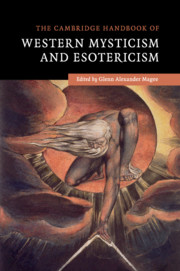Book contents
- Frontmatter
- Dedication
- Contents
- Acknowledgments
- Editor's Introduction
- List of contributors
- I ANTIQUITY
- 1 Ancient Mysteries
- 2 Pythagoras and Pythagoreanism
- 3 Parmenides and Empedocles
- 4 Plato, Plotinus, and Neoplatonism
- 5 Hermetism and Gnosticism
- 6 Early Jewish Mysticism
- 7 Early Christian Mysticism
- II THE MIDDLE AGES
- III THE RENAISSANCE AND EARLY MODERNITY
- IV THE NINETEENTH CENTURY AND BEYOND
- V COMMON THREADS
- Suggestions for Further Reading
- Index
- References
2 - Pythagoras and Pythagoreanism
from I - ANTIQUITY
Published online by Cambridge University Press: 05 May 2016
- Frontmatter
- Dedication
- Contents
- Acknowledgments
- Editor's Introduction
- List of contributors
- I ANTIQUITY
- 1 Ancient Mysteries
- 2 Pythagoras and Pythagoreanism
- 3 Parmenides and Empedocles
- 4 Plato, Plotinus, and Neoplatonism
- 5 Hermetism and Gnosticism
- 6 Early Jewish Mysticism
- 7 Early Christian Mysticism
- II THE MIDDLE AGES
- III THE RENAISSANCE AND EARLY MODERNITY
- IV THE NINETEENTH CENTURY AND BEYOND
- V COMMON THREADS
- Suggestions for Further Reading
- Index
- References
Summary
Life and Work of Pythagoras
The giant figure of Pythagoras straddles the borderline between history and myth. As in the case of his approximate contemporaries Zoroaster, Mahavira, Confucius, Lao Tse, and Gautama Buddha, his followers created an idealized biography that cannot be checked against impartial sources. Even then, they differ widely in their accounts, most of which date from the third century CE, eight centuries after their subject. Consequently, we cannot confirm any of the biographical data, nor even give firm dates for Pythagoras's birth and death.
Certainly his homeland was the Dodecanese island of Samos, and his birth occurred between 580 and 569 BCE. According to Iamblichus and Porphyry, he was born in Syria where his father Mnesarchus (a Phoenician by origin) was trading. After many travels, he settled in southern Italy, founding a school and community at Croton. Around 500 BCE, local opposition destroyed the school, and if Pythagoras did not perish then and there, he died in Metapontum during the following decade. This is the bare outline with which modern scholarship has to be content.
Turning to the legendary life of Pythagoras as reported by the same authors, we find him first studying with the Ionian philosophers Thales and Anaximander, and with Pherecydes of Syros. Next came his voyages to the Phoenician settlements in Syria, where he underwent mystery initiations. The early witness of Herodotus confirms his long residence in Egypt. Having gone there on Thales's recommendation, Pythagoras visited the religious centers of Heliopolis, Memphis and Thebes and was admitted to initiations never before given to foreigners. A fourth, involuntary journey was to Babylon, as a captive following Cambyses's conquest of Egypt (525 BCE), but Pythagoras turned it to good use by studying astronomy and mathematics with the Magi. On his release, he returned to Samos but became increasingly at odds with his compatriots. He made a tour of the oracular centers of Delos, Samothrace, Eleusis, Grecian Thebes, Delphi, and Crete, and he visited Sparta to observe the system of government. After emigrating to Croton, he never returned to Samos.
- Type
- Chapter
- Information
- Publisher: Cambridge University PressPrint publication year: 2016

